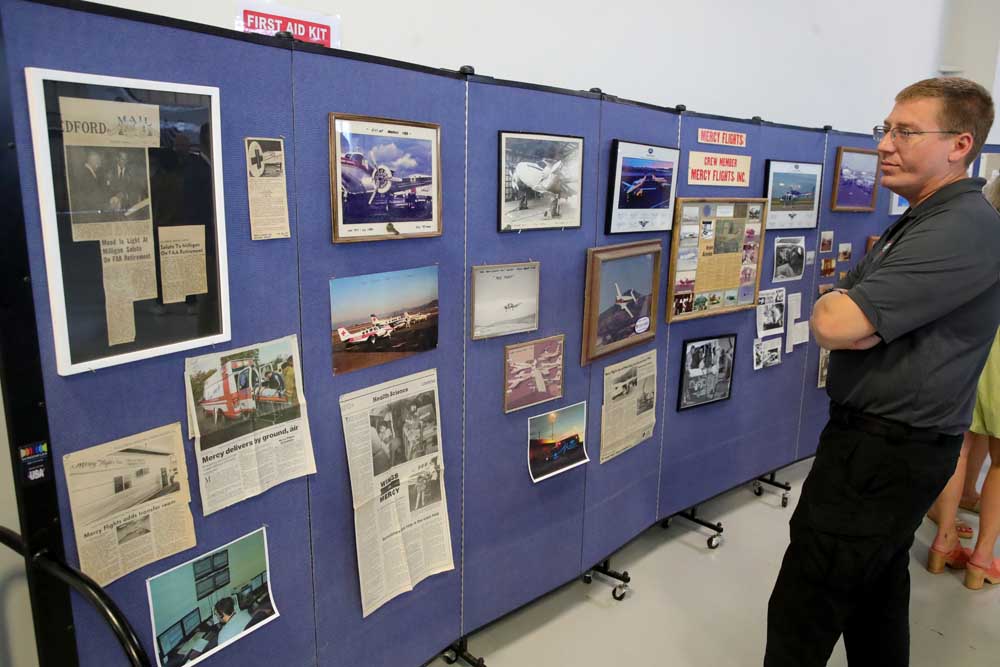On 75th anniversary, Mercy Flights looks to pioneering past, vision for future
Published 4:00 pm Friday, September 20, 2024

- Photos and news clips on display at the Mercy Flights anniversary at the Rogue Valley International-Medford Airport on Thursday.
An organization that began in 1949 as a Southern Oregonian’s novel response to the region’s medical needs and a polio epidemic is looking back on its heritage of pioneering firsts — and glimpsing into its future in emergency medical services and mobile healthcare.
Mercy Flights, the country’s first not-for-profit air ambulance service and Oregon’s only nonprofit mobile healthcare organization, celebrated 75 years of service at its air hangar in Medford Thursday at a ceremony attended by roughly 100 dignitaries that included local leaders, messages of support from Gov. Tina Kotek and U.S. senators Ron Wyden and Jeff Merkley, and the many people who helped make the organization what it is today.
CEO Sheila Clough told the crowd — which included former pilots and board members, mayors, local elected officials and 18 relatives of founder George Milligan — the milestone is “rare, remarkable and an accomplishment that we all should celebrate together.”
Clough said that since 1949 the organization has always had a “strong desire to help our neighbors.”
“This community mindedness has carried on throughout the years as many, many people supported Mercy Flights and provided medical services through our air medical program, our ground ambulance program and, more recently, our mobile integrated healthcare program,” Clough said. “This community mindedness continues today.”
‘Cowboy’ pilots and a spirit of service
Pirkko Terao, Milligan’s eldest granddaughter and soon to be vice chair of Mercy Flights’ board of directors, said the organization and her family are intertwined.
“My mom used to call it one of our siblings,” Terao said. “It’s just always been a part of our family.”
Milligan saw a need for air medical transport after a friend died of polio, and launched the organization on Aug. 24, 1949. Before Interstate 5 was constructed, a drive to Portland took 10 hours on winding two-lane roads.
Milligan worked with community leaders to create the country’s first nongovernment and nonmilitary air ambulance service. Terao noted that not only was the idea innovative, “but it required innovation then to get it going — literally to get it off the ground.”
“They decided to get planes from military surplus,” Terao said. “They knew these planes. They’d flown them in the war and they knew there was plenty of life left in them.”
When the doors weren’t big enough for stretchers, Milligan would cut bigger doors. When Milligan and his crew didn’t have a nearby airstrip for a rescue, they would land in cow pastures, fields and other unorthodox open spaces.
“I have to tell you, they’re kind of cowboys,” Terao said. “Truly it was innovation at every turn.”
Inside the organization’s modern hangar, many former pilots remembered Milligan as a mentor who helped launch their careers by encouraging them.
“I was just an airport nuisance kid,” pilot Lee Gossett remembered. “He encouraged me to fly.”
Charlie Swingle reminisced about his first ride in Mercy Flights’ new Twin Beech airplane in 1956 and being a pilot in the 1960s. He remembered how, without Milligan and Mercy Flights, “farm kids like us” wouldn’t have had opportunities such as flying a multi-engine aircraft.
“He was a really great guy,” Gossett remembered.
Central Point Mayor Hank Williams remembered helping Milligan as a copilot in the early to mid 1970s, and the way Milligan cared.
“It took a guy like Milligan to get it started,” Williams said.
Reflecting on tragedy
Milligan died Feb. 9, 1985, during an air transport of an elderly patient after the twin engine Aero Commander lost power, crashed and exploded. All four souls aboard died, according to a Mercy Flights history book co-authored by Terao.
It is one of two fatal crashes in Mercy Flights’ history, the second being a 1989 turboprop Beechcraft King Air turboprop that crashed attempting to land in the fog at Gold Beach Airport.
Terao reflected on the tragedy prior to the ceremony.
“It does make milestones like this more poignant,” Terao said.
Mercy Flights today
Mercy Flights expanded its scope to ground ambulances in 1992, when the organization bought Medford Ambulance Service.
Smaller commercial emergency services agencies were beginning to either cut back on service areas or deny service to patients who could not afford it, according to the Mercy Flights website. Today the organization has two helicopters, three airplanes, 30 ground ambulances, seven support vehicles and a staff of nearly 200.
In 2023, Mercy Flights transported 260 patients by helicopter, 450 patients by airplane and responded to more than 28,000 ground requests for medical care.
Adapting to the needs of the community
Medford Mayor Randy Sparacino, who is the Republican nominee for Jackson County Commissioner and was Medford’s police chief until his retirement in 2019, spoke at the ceremony praising Mercy Flights for how the organization “strives to meet our community’s evolving needs.”
“Their adaptability shines through innovative collaborations, like the tiered response model that we use with the Medford Fire Department,” Sparacino said.
He spoke about how that model ensures Medford firefighters are available for responding to both fire calls and medical calls.
“These efforts are practical, and they’re groundbreaking steps that enhance our community’s preparedness and response capabilities,” Sparacino said. “Mercy Flights’ presence in our valley is truly invaluable.”
A glimpse of the future
Clough, Mercy Flights’ CEO, closed the ceremony by saying that the organization’s pioneering spirit continues. She shared a vision of a Southern Oregonian calling 911 and getting treated at home.
“Our team quickly shows up by the side of that patient in their home, bringing the compassion and the medical expertise and the skill and the technology of a hospital emergency room team — right in the home,” Clough said. “This is the future of mobile health care. This is the future of Mercy Flights.”
Clough said they are “creating a system of pre-hospital care” designed to enhance outcomes and minimize costs for patients.
Acknowledging the other healthcare agency partners in attendance, Clough said the big picture idea is to reduce the strain on hospital emergency departments and health systems.
“We need our emergency departments, but as our population ages and the demand for that care goes up, these hospitals need to be focused on those critical emergencies — the heart attacks and the strokes and the traumas,” Clough said.
“If we can keep patients in their home and take care of those lower acuity emergencies, think of how we can work together to better serve our communities together,” Clough added.
She said Mercy Flights is working to remingine “an efficient, affordable and patient-centered approach to healthcare.”
“Let’s revolutionize the way in which our neighbors receive their care,” Clough said.







